God is Everywhere: Vocal Ministry in Everyday Conversations
Quakers tend to think of “vocal ministry” as someone standing and speaking in a Meeting for Worship. But when we approached O about doing an episode with us, she invited us to expand our thinking. What if we treated every conversation as though God could show up?
Join us as we walk with O in her everyday conversations, listening for where God shows up.
Subscribe so you don’t miss an episode!
After you listen, tell us what you thought of this episode in the comments below!
Download the transcript and discussion questions.
Discussion Questions
- Have you ever had an everyday conversation that took an unexpectedly spiritual turn?
- What would your life look like if you were listening for God in every conversation?
O
In meeting for worship, God is inviting us to come deeper, come drop down, come down to meet me, that I may offer you this gift. And I think that’s what I listened and I listened for as people are speaking because I actually do believe in each and every situation. God is attempting to have a conversation. God is wanting to be met. And so, at first, often what will happen is, is people will be in their heads, and they’ll be having the conversation from their head, which is fine, yay. But all of a sudden, I will hear God break through. And it’s usually tender. There’s a tenderness in it. And the brain just wants to keep going, but I heard I heard the breakthrough, right? And it’s like, oh, no, there’s that sweetness there. Let’s go see what God is trying to say here.
Various
Thee Quaker Podcast: story, spirit sound.
Jon Watts
I’m Jon Watts.
Georgia Sparling
And I’m Georgia Sparling.
Jon Watts
And today we have something really special for you. As you may know, every fourth episode or so we’ve been doing something that we call a vocal ministry episode where we take you inside of a meetinghouse somewhere in the world to hear a Quaker give a message.
Georgia Sparling
That’s right. Some of these messages are prepared in advance for what’s called a programmed meeting, and some are invented on the spott, but they all share the intention of being guided by the Spirit.
Jon Watts
Yeah. And and today, we’ve got a fifth vocal ministry episode for you this time, entirely unprogrammed. And in fact, we’re going to break the mold even further because our minister today is O.
Georgia Sparling
O as in like the letter O?
Jon Watts
Yeah. Like the letter. I’ve never heard anybody call her anything else. So when I first met, oh, I was at Pendle Hill in 2008. I was a groundskeeping intern for the summer. So you know, I was responsible for like weeding the flower beds, basically. The first memory I have of O, was that she came up to me while I was on my hands and knees in the dirt and said, “Thank you for taking care of the plants.”
Georgia Sparling
Okay, well, that sounds really nice.
Jon Watts
Yeah. And it wasn’t just like a “Hey, thanks for taking care of the plants.” It was like I felt the gravitas of the words in that moment. And it it felt like it was my, like sacred duty, you know, to take care of the plants.
Georgia Sparling
Yeah, it’s not easy for a simple phrase like that to convey so much meaning, especially from somebody you don’t know.
Jon Watts
Right? Yeah. Well, that’s, that’s O, in a nutshell, you know. Anyway, we’ve we’ve stayed in touch. And now we’re actually members of the same meeting here in Philadelphia. And she often stands on Sunday morning and offers vocal ministry. And every time she does, it has a big impact on me, you know, like, it kind of changes the rest of my day, basically. Yeah.
Georgia Sparling
I love people who have that way with words and just wisdom.
Jon Watts
Yeah. And so of course, she came to mind when I was thinking about how to approach an episode featuring vocal ministry in an unprogrammed context.
Georgia Sparling
So are we going back inside of Central Philadelphia Meeting today?
Jon Watts
Well, not exactly. It’s, it’s actually something much broader than that. I’ll let O explain it.
O
My name is O, and I am held very tenderly at Central Philadelphia Monthly Meeting. It’s been my meeting forever. And I already forget the question. The other question,
Jon Watts
Where do you live? O, where
O
Where do I live? Yeah, I live on this amazing, beautiful, sacred holy planet that they call it earth. And the actual proximity is Philadelphia, Pennsylvania. So a part of Quaker theology is that that of God dwells within everyone, and that we’re all ministers. And what that is, in some ways, is the ability to really hunker down like to go down deep into the conversation that God is offering us. And to do some really deep listening in from the still place the scripture in the Bible that says, “Be still and know.” And so it’s an end invitation into the stillness outside of the news, beyond the news, outside of the chatter outside of the grocery list, but to really drop down into the place that we also speak of as the still small voice and listen and locate and be touched.
Jon Watts
Yeah. So tell me about your own your personal experience with that practice. What is, when you’re sitting in a Meeting for Worship and you feel that a message is coming to you? What does that feel like in your body?
O
You know, often when I’ve heard other people speak about it, they speak of it as a quickening, you know, their heart may start pounding and their hands may start sweating. And there’s this, this question of, you know, oh, you know, oh, you know, am I to stand? And so there’s this sweetness of really wanting to till the field, to really make sure and so there’s, there’s this inner movement of quickening, quickening, that can overcome a person. Though that is true, I think the way in which it enters into my body is I actually get quieter. Things get really still, like, almost like flatlining, it’s really quiet. And there is the place in which the Bible speaks of it, of it as “a peace, that passeth understanding.” It’s that still. And when I find myself in that place, what’s it’s it’s almost like a it’s like a yin and a yang. It’s really quiet and still and peaceful and deep and rich in the soil. But because it’s so different than what the normal chaos is, there is also that place of excitation. So it’s a yes and. And in that, again, there is still the place of asking, Is this is this mind to stand? And then if I if it feels like yes for it to be represented and offered as a gift, then I will stand. I will stand. Yes and offer in faithfulness.
Jon Watts
So when I reached out to you to do one of our vocal ministry episodes, you said yes. I’m very excited about that. I’m really looking forward to this. I explained to you sort of what we’ve been trying to do, which is to go into meetings and get recordings of sort of vocal ministry happening in its authentic, you know, in its home, and you you offered an invitation, which is a different format than we’ve tried before. And I wonder if you could explain for my listeners, what that format is that we’re going to be experimenting with together on Sunday. And and why you proposed that?
O
Yes. Yeah. Because, you know, once you enter that realm, that’s the in-between worlds where you’re one in the depth, width, and breadth of the fertile ground of Spirit, and you’re still hanging out here on Earth, but at the same time. The more that happened in my own personal experience, the more I realized, there is the potential of living, vocal ministry. It’s not, I mean, it’s wonderful for it to show up in a building and a space on Sundays or Fridays or Saturdays or Wednesdays midday meeting. And that’s wonderful. And we need that. And there’s the yes and the and is what it’s like to live it, you know, what it’s like to embody it and recogniz one, that Earth is our home or earth is the space where we get to practice. And that every interaction is an opportunity to do vocal ministry, to be an ambassador, to be a representative to be a conduit of awakening, and call and response and invitation for liberation, every conversation, and it’s reciprocal. It’s not just me, being a conduit, or an invitation and offering of spirit to another, but it’s also making sure that my ears are open, my heart is open, my mind is open to recognizing when God is speaking to me, through a child, through a teenager, through one of the elders in the community, through somebody who is houseless. Like, when is it that God is really attempting to get my attention? And so it’s an opportunity to open and expand what vocal ministry really can look like. And that’s what we’re going to be doing.
Jon Watts
Yeah, so, so tell me about it. What are we going to do? How are we going to talk to you? And what? What is the opportunity there as you see it for vocal ministry? What are you going to be listening for?
O
So as I shared, you know, real or imagined, who knows, I am always doing vocal ministry. And so, and that’s exciting. It’s an exciting way to live to know that I will only be here 70, 80 years, and why not lend my voice to that kind of focused loving. And so we will have an opportunity to see what vocal ministry looks like when I’m in conversation with some of the young black men who are dear to my heart, who are supporting me in learning the struggles, and the difficulties about being a man of color as we are walking during this period of our evolution.
O
And so we’re going to check in, and we’re going to say, hey, you know, how’s it going right now, as you’re walking in Philadelphia. We will also, one of the major places where I do vocal ministry is with my family, who obviously is dear to my heart. And so we will be tapping in with my daughter, who is a kind of sort of a new mom and is experiencing all the challenges and the struggles of being a mom at any generation at any period of time, but especially during a period of time she had my granddaughter during COVID and what it’s like to be a wife and a mother and the challenges at that level. And also, we will be tapping in with one of the elderly women who I check in with and make sure that they are okay, and seeing, you know, what is the nature of the fertile ground of her heart? Like what is she moving through as an elder in the community, and practicing that art of positive inquiry, like really having a willingness to not just on a surface level, ask people questions, but really have a willingness to be intimate.
O
I choose to believe God is calling us to intimacy these days, how to be intimate and provocative. In a way in which we are reaching for, we are reaching for the soil of each other’s soul. And when we reach for that soil, how are we tilling the field of the soul in order to awaken the seeds of imagination for a better world than the one we’re living in, but to also be able to hold the pain and the sorrow and the sadness and the grief that we’re not there yet. We’re not there yet. But hopefully, this kind of work this kind of listening, this kind of vocal ministry, both as listener and sender will support the transformation that we are so desperately in need of right now.
Jon Watts
Thank you, O. I look forward to going on this journey with you.
O
I’m excited, Jon. Wherever you are, I love being there. It’s like let’s do it together.
Jon Watts
Ditto. After the break, oh, and I spend a Sunday traveling around Philadelphia, having conversations and listening for God.
Georgia Sparling
Hey, it’s Georgia again. I’m coming on with Jon to talk about what’s going on with Thee Quaker project, the nonprofit that makes this fine podcast. We are more than a podcast organization. We’re a Quaker media organization. And we’re entering a new phase of the project. What is this new phase, Jon?
Jon Watts
Yeah. Hey, Georgia. Yeah. So we went into this thing with a big vision. You know, Quakers in the early years, called themselves publishers of truth. And so we started this organization in order to lean into what we see as one of the big questions of the 21st century. What does it look like to engage internet media from a place of spiritual faithfulness, and maybe even spiritual courage? So this podcast is the first step in that process. We are building an ecosystem of online projects. And we’re so happy with how this one has turned out. But now that the podcast is up and running, we have started planning our next two projects, which will both launch in 2024.
Georgia Sparling
And you’ve been responsible for almost all of that. So what does this season look like for you?
Jon Watts
Yeah, well, each of these projects needs startup funds. And as the executive director, it’s my responsibility to make sure that they get that support. I have to say, I’m brand new to fundraising. And so I’m still kind of getting my feet under me. But we are so lucky that the Quaker community has been enthusiastic about this vision and has been really generous in making it happen so far. Last year, we launched a campaign to raise the startup funds for this vision and exceeded our fundraising goal. So that’s how we were able to hire a podcast producer and make this show that you’re listening to right now. So this year, we have our work cut out for us to get these next two projects launched. So we’ve started a new campaign, you can track our progress on our website, we’re calling it Thee Quaker phase two. And our goal for phase two is ambitious. And we’ll need all the help we can get, but we have some great news, which is that we got a grant from the Thomas and Mary Williams Shoemaker Fund, which puts us halfway there.
Georgia Sparling
And that’s amazing. I know that you’ve put so many hours into connecting with potential partners and traveling to meet people in person and just getting to share your vision with folks from on multiple continents.
Jon Watts
Yeah, I have I’ve it’s actually a really rewarding part of my job to get to have these conversations because it’s about, you know, shaping a vision for the future. And that’s exciting.
Georgia Sparling
So what will the next few months look like for you?
Jon Watts
Well, yeah, the sooner we’re able to reach that goal, the sooner we can launch the next two projects. So you know, one thing at a time.
Georgia Sparling
Yeah. And one last question, how can our listeners help?
Jon Watts
Yeah, well, every week we’ve been hopping on in the middle of the episode to let you know that the podcast could really use your monthly support. I hope you don’t mind if we, you know, once a year or so we also let you know that it’s bigger than the podcast. We have plans in the works to launch a Richard Rohr-style daily Quaker devotional, and a new Quaker video project where we partner with local meetings to tell their stories. But all of these things take resources and we could really use your support. So if you go to TheeQuaker.org/support you’ll see more about our overall vision. And there’s also a page there where you can give a one time gift.
Georgia Sparling
And you can still give to the Patreon if that’s more your speed.
Jon Watts
We are yeah, we’re so thankful for every donation.
Georgia Sparling
Yeah, we sure are. So please visit TheeQuaker.org/support to find out more.
Susan
Hi, my friend. Come in.
O
All right. Thank you. Good to see you.
Jon Watts
So now we’re going to take you on a journey through these three conversations. We’ve edited them some, but for the most part, I’ll just step back and let it run. For this first one, we visited Susan in a suburb just outside of Philadelphia. Susan is a friend of O’s who is in her 80s. And she is going through a divorce.
O
Thank you for the open door.
Susan
Always.
O
Yeah, really appreciate the open door. I know you’ve been moving through, in, around in the midst stuff. And so I just wanted to make myself available to be with you as you’re going through some of the things that you’re exploring.
Susan
Yeah. It’s been hard. The divorce was final this week. And it was not one that I was choosing, so I’m very, very, very sad about it.
O
I’m imagining tender.
Susan
Yes, tender. So it’s fitting that we’re not living together now, but I wish we were being friends.
O
So I’m going to slow you down because that’s what I do often. Yeah, so let’s just pause for a moment. Let me be with what I heard you say.
Susan
I actually moved in on August 5 and then fell down the stairs here.
O
You fell?
Susan
I fell. And that
O
Well, wait. Okay, I know. That’s easy for you to report. I fell. But I felt that.
Susan
Yeah, this threw me into the, the emergency room and the ICU and then rehab. And I was actually more present. With the people that were in the rehab situation, the staff that was taking care of me. I was present to them and relating to them in a way that I had never done before. And because I was in that rehab situation, there wasn’t much expected of me. I knew that my job then was to heal. And there was a relief in that.
O
That touched me. My job was to heal. Yeah, how’s that for you when you hear that reflected back to you? My job was to heal.
Susan
I feel understood. I was definitely misunderstood in the marriage.
O
Not fully seen,
Susan
Not fully seen and not understood.
O
What does that mean to you?
Susan
That means that you can only be fully seen by somebody that sees fully. I experienced you as a person that sees fully.
O
Yeah, I think that’s reciprocal. A large part of the ministry or the path I’ve chosen to live on is the commitment to see because life is precious, because life is sacred because it is holy. And not everybody wants to be seen. Right? So one of the things that I appreciate and value in the ways in which you and I connect with each other is this you want to be seen.
O
Hey. Hello.
Jack
Hello friend, how are you?
O
Oh, good to see you.
Jon Watts
Our second conversation is with Jack who we talked with in his apartment on the campus of the University of Pennsylvania, while his two nieces patiently waited in the next room.
Jack
Now what are we doing again?
O
What we’re going to do is some deep listening. And you get to just be you. You know, the ultimate question is going to be what’s it like being a black man today in America?
Jack
Mentally it’s heavy to be me as a Black man right now is heavy. Not only am I forced to think about being a Black man in particular. And every environment that I go into whether it’s social in a store, and you know, my school community, it seems like I am forced to think about race. And me being a black man or self identify a black man in some capacity.
O
Jack. Jack, what’s that? Like?
Jack
It seems unfair. And what’s it like now is I’m used to it, you know, and I don’t I shouldn’t have to be used to that.
O
Wait a minute. So what what is acceptable is not a Black man.
Jack
What is acceptable is not a Black man. So I think they’re quite often throughout my development, I’ve learned to really kind of camouflage me, in many regards. There’s still a sense that I’m wearing a mask.
O
How does that affect and or impact you? Like your soul?
Jack
One of the ways I feel like I have to find balance, and the way that I seek balance is generally through music.
O
And so when you find that music, what happens to you?
Jack
I become something different, and someone different.
O
Can you locate that and share a little bit more about what that is?
Jack
Sure. So what I’m thinking of now is like, like an ocean, or like, sort of the comparison between like rain and an ocean. It’s generally raining, like in my world, and I’m just a drop usually, and I’m, I’m hitting other things like maybe cement, you know, and these are, this is my, my norm. And when I play music, I’m a part of the ocean, this is the drop, I become a part of everything. And I really don’t know another way to kind of express it. It feels like, you know, the instrument I play, I play the violin, I play strings. There’s a feeling that you get when you play and you’re, in the midst of an orchestra, of many sounds a cacophony of you know, just sort of like beautiful vibrations, and you kind of get lost in it. You know, you feel like you are greater than yourself, so that’s, that’s how I feel when I when I play music.
O
That was contagious. I felt that like where you went, Yeah, my body began to vibrate with that. And what I’m hearing is, is in some ways, that’s closer to the truth of who you really are.
Jack
Indeed
O
Would you be willing to play a little bit?
Jack
I could.
O
Hi, sweetheart. So where’s Willow? She’s asleep.
Jon Watts
This is our final conversation of the day and it happened late in the evening. O, came over to my studio to call her daughter Toni in Texas, after Toni had put her daughter to bed.
O
So what were you guys up to today?
Toni
Just emptying boxes, but sometimes she needed my attention. So..
O
She needs your attention a lot?
Toni
Yeah, she needs my attention a lot.
O
How’s that feel for you?
Toni
It’s hard to say the least. I wasn’t expecting it to be like this. I know, I know, being a parent is the hardest job on the planet. And yeah, this is the hardest job. It’s like it’s draining it’s hard to find time for myself to fill my cup up.
O
I remember the other day you called. And I was like, where are you? You’re like, I’m out driving by myself. And that was like, you were like so excited.
Toni
I was which I feel shame and guilt for that say more. The guilty part says you shouldn’t you shouldn’t feel this happy away from your child.
O
Can I slow that down a little?
Toni
Sure.
O
So I think what I heard you say is so there’s this mommy guilt thing we’re talking about early on part of the conversation there is I shouldn’t feel this happy when I’m away from my little one. And so the story you make up about that is that’s really bad.
Toni
Yeah.
O
And because I know your history because I’m your mom, I know some of the root of that. I want you liberated from that past wound, when I wasn’t there for you. And so somewhere in there because I wasn’t there. You have that. entwined with your relationship with Willow. I want you liberated there. That doesn’t belong to you, that belongs to you and I, but that doesn’t belong to you and Willow. Does that make sense? Right?
Toni
Yeah.
O
So thank you for allowing me to knock at your door. Check in on you see how you’re doing around this. Mommy? Wife, two dogs, a house.
Toni
Oh geez.
O
Yeah, just all of that. As well as continuing to attend to our relationship as well.
O
So, O.
O
Yes, Jon.
Jon Watts
It’s 10pm on Sunday evening. We just spent the full day traveling around Philadelphia to different places to have these conversations. How are you feeling?
O
I think I’m feeling in some ways the responsibility of communication, the responsibility of connection, that the way in which we listen or the way in which I listen and really let people touch my heart and till my soil affects and impacts the fruit that comes from that.
Jon Watts
How do you feel like those three conversations went?
O
The path that I’m on is the path of intimacy. It’s like, I’m really committed to intimacy. And, and I love playing with words, and the concept of intimacy is: into me and see. And so how I feel that it went is it was very intimate with, with all three. Just that willingness to be transparent, that willingness to be vulnerable, the willingness to be raw. And I think that, that that’s our true nature, I think that’s where we really are. And we are under under practiced and underdeveloped and our capacity to really be engaged in that way that we are really listening each other into wholeness, right? Instead of not listening and distracted with our cell phones and our to-do lists that often we’re not present and what we really miss out on in those distractions.
Jon Watts
So our our premise for doing this experiment this weekend was that vocal ministry doesn’t need to be contained to the meetinghouse on a Sunday morning. It doesn’t need to be contained to standing up from a bench and speaking. that it can happen in our conversations and our connections. And I want to check in with you about that premise. And how what are what are the ways that you feel like Spirit and God and and ministry showed up for you in these conversations today?
O
Yeah, I think the traditional ways of doing worship are important and necessary and I think it’s important not to limit it there. And so I think this is an invitation and an opportunity for us so really recognize it. There’s a passage in the Bible where Jesus says, “I and the Father are one.” May we all be one. And I feel that there is this hunger, there’s this longing, there’s this need to be seen, and heard and valued. You know, we heard Jack talk about the masks and my daughter talking about feeling lost, and Susan talking about the vulnerability of the marriage ending, and her finding herself in her own space. And so each of them are carrying rich stories, like stories that need to be heard and held as sacred, and precious and beautiful, but really heard, you know, really heard and held.
O
And so I feel that in some ways, what you did is you gave all of us an opportunity to be heard. The tenderness, the vulnerability, the sweetness, the preciousness, the anger, the frustration, the masks, it’s like, and the possibilities for real deep connection. And so I think this obviously, was a blessing. And I guess for everyone who got to participate in the conversation and the connection. And I want more of that in the world. Like, I want all of us to recognize our fear, fear, feel the fear of intimacy, like feel that and not let it stop us from asking the poignant questions where a person gets to come up and out. For real, authentic heart to heart storytelling.
Jon Watts
I wanted to ask you about something I noticed in the conversations that you had today. I noticed that you were very gentle and accepting and present with each person that you were speaking with. And when, however, they wanted to answer the question, you seemed ready for how, if you’re feeling self conscious, if you’re feeling anxious, if you’re feeling angry, if you’re feeling ready for that question, however, folks showed up for it, you were I felt you ready, ready for that?
Jon Watts
However, at a certain point in each conversation, you stepped in with with a more firm suggestion. A lot of the, I think in every conversation, so a lot of the times that suggestion was, I need you to slow down right there. That’s the spot. And every time the conversation picked back up after you made that point, made that request
O
to slow down
Jon Watts
to slow down,
O
to pause.
Jon Watts
Something had changed in the room, as I experienced it. And so I wanted to ask you about that. How do you know when that when that moment is what’s happening for you in that moment? When you hear something that you say, “Let’s slow this down”?
O
Yeah, I think that’s the place where we talk about in Meeting for Worship, where you’re listening for God’s voice. And, and God is actually in Meeting for Worship, God is inviting us to come deeper, come drop down, come down to meet me. That I may offer you this gift. And I think that’s what I listened and I listened for as people are speaking, because I actually do believe in each and every situation. God is attempting to have a conversation. God is wanting to be met. And so at first, often what will happen is, is people will be in their heads, and they’ll be having the conversation from their head, which is fine. Yay. But all of a sudden, I will hear God break through. And it’s usually tender. There’s a tenderness in it.
O
And the brain just wants to keep going, but But I heard I heard the breakthrough, right? And it’s like, oh, no, there’s that sweetness there. Let’s go see what God is trying to say here. And so I lean in and I say, whoa, whoa, whoa, whoa, whoa, whoa, whoa. Hold on, hold on. And I think in my mind, probably what I’m saying is, is, let’s listen for the still small voice. That whisper. Let’s go back there and find that and see what and let’s uncover that. And that’s just, there’s just such richness and sweetness and power. And when I say sweetness, I don’t mean sugar and spice and everything nice. I’m not talking about that kind of sweetness. I’m talking about the sweetness of truth. I’m talking about the sweetness of the potential liberation from all the lies we have been taught. All the oppression. And God is attempting to break through, to say something that might get us beyond that. And I go after that, it’s like, let’s go there. And things do shift, the energy does shift.
O
Because God wants to speak, God wants to come out. God wants God wants to be seen. God wants to be heard. God wants to be recognized. God wants to be liberated from all of the oppression. And we can midwife that for each other. That’s the world I want to live in. That’s the one I’m living it. That’s the world. I’m really Yes. Yeah, I don’t even know how to language that yet.
Jon Watts
If someone’s listening to this, and feels inspired by your invitation, to walk through the world in a way that we’re looking for God, in our everyday conversations. How do you get started on that path? What do you what do you do when you wake up in the morning and say, yeah, anything could be vocal ministry. How do you prepare for that?
O
Yes. Well, you know, I hear so many of my Black and Brown siblings say, look, I woke up this morning, that in of itself is a miracle and a blessing. And so there’s that place of, of waking up and recognizing that that in and of itself is a miracle. That is a blessing. And then what I do with that miracle, and what I do with that blessing is totally up to me. And my relationship with spirit. Recognizing that no matter what the challenge, no matter what the struggle that in each and every moment, we have an opportunity to be an ambassador of something. And every moment we get to be ambassadors, and sometimes we’re ambassadors of anger, and sometimes we’re ambassadors of frustration, and sometimes we’re ambassadors of sadness, sometimes we’re those ambassadors. And in each and every moment, we also have an opportunity to decide if we also want to be ambassadors of love. And what I noticed for myself is when I recognize that I can make those choices, and that I want to be an ambassador of love, like that’s what I want that my body posture shifts. Anyway, so yeah, I think a part of that work is to recognize that at any point in time, we can be ambassadors of love.
Georgia Sparling
Thank you for listening, and thank you to O, Susan, Jack and Toni for being a part of this episode. If you’d like to share your thoughts on what you heard, please head over to QuakerPodcast.com. While you’re there, you can also download our discussion questions, a transcript, and listen to other vocal ministry episodes.
Georgia Sparling
This episode was produced and edited by Jon Watts and, me, Georgia Sparling. Jon also composes the music for each episode. Thee Quaker Podcast is part of Thee Quaker Project, a Quaker media organization with a focus on lifting up voices of spiritual courage and giving Quakers a platform in 21st century media. If you want to give to our work, we would so appreciate it. Please consider becoming a monthly supporter. You can learn more about how to join our giving team at TheeQuaker.org That’s TheeQuaker.org. Every contribution expands our capacity to tell Quaker stories in a fresh way. Again, thank you so much for listening, and we will be back in your ears next week with a new episode.
Recorded and edited by Jon Watt and Georgia Sparling.
Original music and sound design by Jon Watts (Listen to more of Jon’s music here.)
Supported by listeners like you (thank you!!)
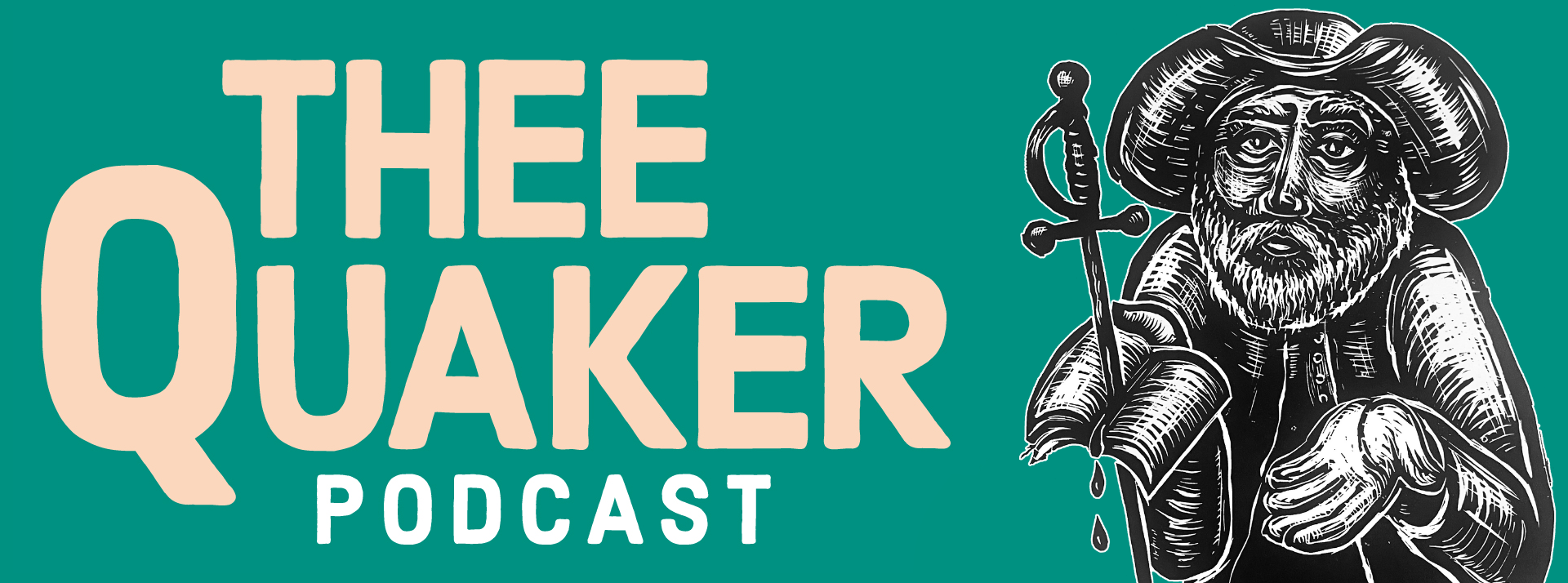

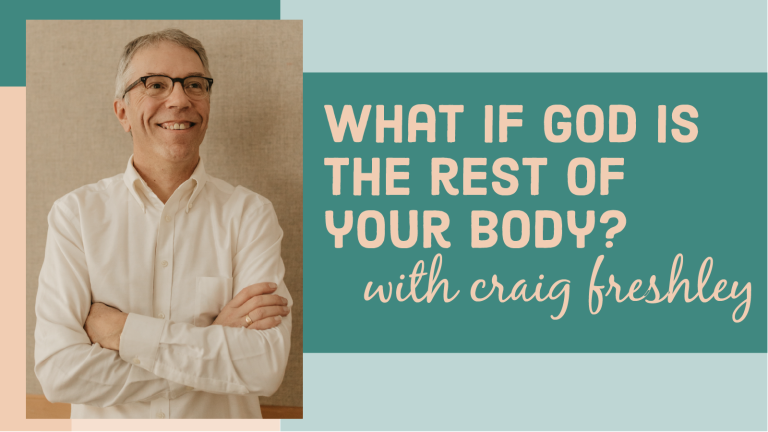
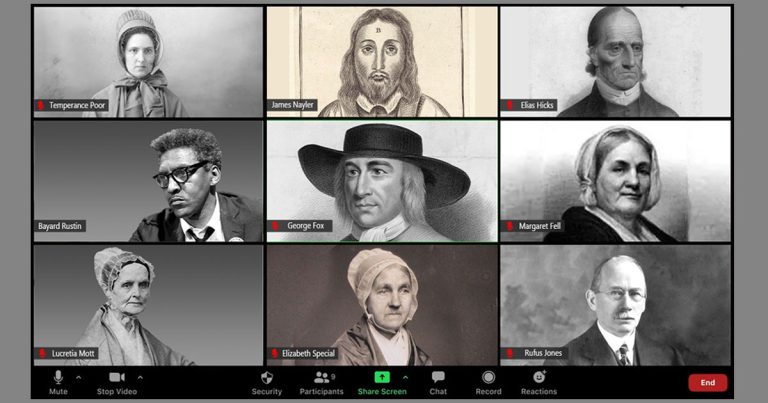
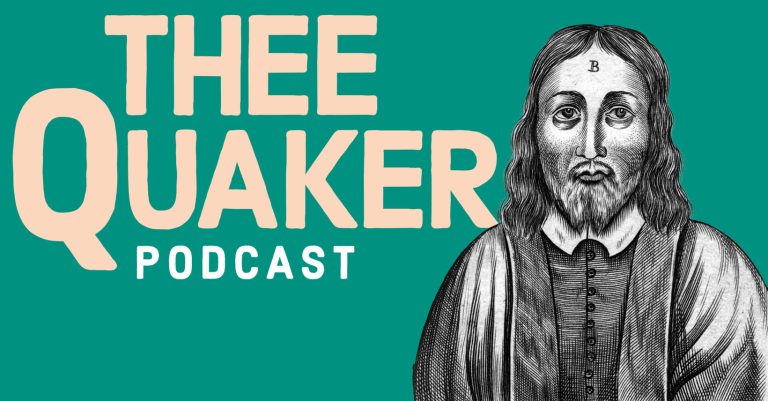
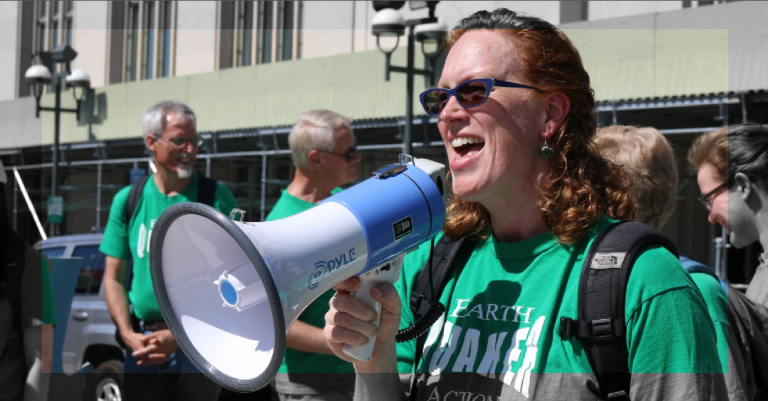
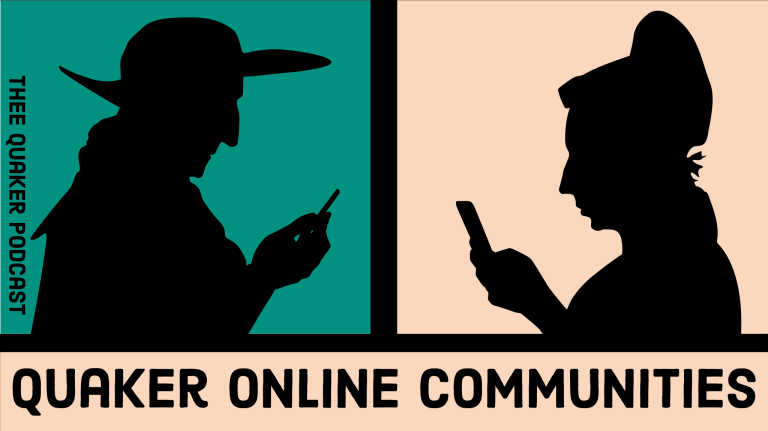
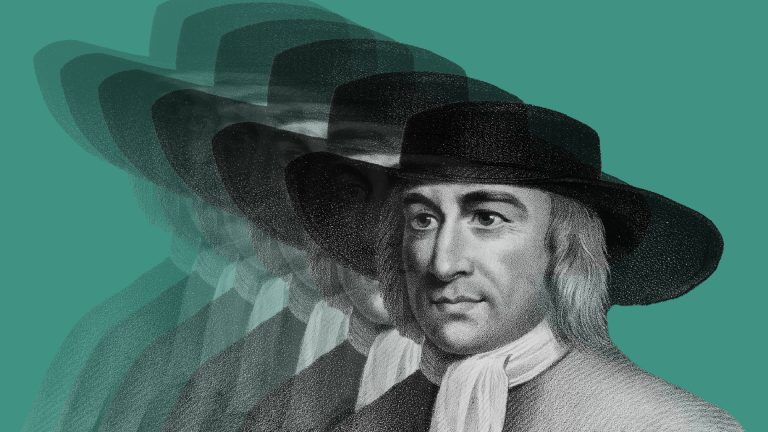
great first season! This seemed the most evocative invitation to Quakerism of all of the episodes for me. It has me thinking I need to revisit others to see if that is a true statement. The guest’s grounding, centering, is enviable.
Thank you, Jon, Georgia, and O. What a wonderful episode, if that is the right word. Some related, awakened thoughts: At one point, when Jesus’s friends urge him to have some food, he replies: “I have bread you know nothing about. My bread is to do the work for which the Father has sent me.” In what we call The Lord’s Prayer we are urged to ask that we be given our daily bread. If the above is a definition of bread, then we are asking to be given God’s work to do this day, in addition to physical sustenance. It is apparent to me that that is what O is doing: asking each day for the opportunity(ies) to be truly present, truly seeing to one or more fellow travelers. I try to do the same, but she is an inspiration to be more faithful.
Yours gratefully,
Joe
ps It is a joy and honor to be able to help fund this project.
O seems such a thoughtful and deeply tender person. The voices of Jon and O resonate with a flow of Spirit. I felt uplifted and peaceful in the presence of this episode. Thank you, all, for such a gift as this. Indeed, deep listening, slowing down and connecting with “be still and know ” moments ground us in what is often a chaotic external world. The music was wonderful, too!
Thrilled to hear O still listening to Spirit this way – and sharing with others. I knew O at Pendle Hill YEARS ago, learned so much, and never thought I’d get a chance to meet again. Would love to be back in touch if O wants to reach out.
This podcast was a gift. O’s experience with each of her friends opened a door to understanding someone whose identity is different than mine. Yet, I felt connected and respect their vulnerability. My heart truly expanded by this podcast.
I struggled to listen to this, and in fact stopped after a few minutes.
In my Yearly Meeting it’s very unusual to minute the exact content of spoken ministry, unless it is prepared ministry. I think there are good reasons for this. The messages spoken during a meeting for worship are through the people there at the time and I tend to believe are for the people there at the time. The messages spoken in the conversations that you recorded I think of the same way. Are they for me, here, now: days later and thousands of miles away? Listening to these conversations seemed to me very much like listening in on someone’s counselling session. I’d go so far as to say that in some cases that’s exactly what it was. I felt very unhappy about it and stopped.
I relate to O’s observation regarding living vocal ministry. It’s the standard that many early Friends held up for themselves. Good to see that perspective re-emerge among us – serious listening!